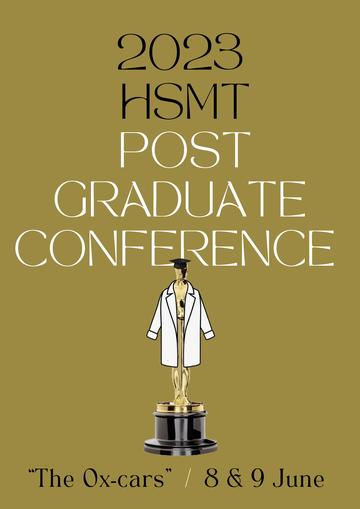2023 HSMT Postgraduate Conference: The Ox-cars

Download conference booklet
Download conference poster
2023 HSMT Postgraduate Conference: The Ox-cars
8 & 9 June 2023 - Faculty of History, Oxford
The two-day conference plans to illuminate – in bright white spotlight, of course – the dazzling research of this year's cohort. Bringing historical narratives to life in intricate detail, the conference spans four centuries and will discuss topics ranging from Scottish asylum patients’ use of expression in patient-produced magazines, through to counter cartography in late twentieth-century Chocó, Colombia. So, why indulge in a Hollywood Blockbuster when you have the most thought-provoking narratives right on your doorstep? We look forward to you helping us roll out the red carpet and erupting in applause. (Popcorn not provided!).
Programme
|
Thursday 8 June |
|
|
|
|
|
09:40-10:00 |
Registration |
|
|
|
|
10:00-10:10 |
Opening Monologue: Professor Rob Iliffe |
|
|
|
|
10:10-11:00 |
Session 1 – Theories of Nature |
|
|
Tinius Bentsen Dragland, Science by comparison: justificatory analogy and its decline in European thought, 1780-1820 |
|
|
Ariana Orozco, Militarizing nature: the impacts of violence on Colombia’s Pacific Coast (c. 1966-1996) |
|
|
Chair: Emmay Deville |
|
|
|
|
11:00-11:20 |
Tea/Coffee |
|
|
|
|
11:20-12:10 |
Session 2 – Eugenics |
|
|
Mahealani Daniels, Dissecting America’s model identity: a historical examination of Harry Hamilton Laughlin’s idealized body politic and reconciliations with American freedom |
|
|
Lauren Devine, The ascent of crypto-eugenics: the American Eugenics Society’s Princeton conferences and the rehabilitation of “the wellborn science” in 1960s-America |
|
|
Chair: Grace Aquilina |
|
|
|
|
12:10-13:10 |
Lunch |
|
|
|
|
13:10-14:20 |
Session 3 – Disease |
|
|
Anubhab Chatterjee, A case study on Colonial resistance: probing the bhadraloks’ public health drive during the plague outbreak in Bengal viz. Calcutta (c. 1896-1914) |
|
|
Florian Gregor Eichhorn, When did the Spanish Influenza pandemic end? Occupation accusations and virulent “Schwarze Schande” propaganda in the French medical and military administration of the German Rhineland Region between 1920-1923 |
|
|
Benjamin Rymer, “Against the climate, who can contend?” Disease in the Peruvian War of Independence, 1820-1824 |
|
|
Chair: Lorelei Robinson |
|
|
|
|
14:20-14:40 |
Tea/Coffee |
|
|
|
|
14:40-16:10 |
Session 4: Institutions |
|
|
Grace Aquilina, “The world Is hard on women”: institutionalised mothers, worthiness, and the professionalization of care |
|
|
Emmay Deville, Patients’ use of Crichton Royal Institution’s New Moon as a vehicle of expression and change, c.1890-1910 |
|
|
Thea Ralph, “The sewing machine men are happy”: corporate ambivalence and the sewing machine in the American sweat shop (c.1890-1920) |
|
|
Ella Stalder, “The Moscow Games might as well have been called the Chemists' Games”: athlete testing, a gendered and western reaction to the sporting success of marginalised bodies, 1968-1999 |
|
|
Chair: Ariana Orozco |
|
|
|
|
16:10-16:20 |
Closing Monologue: Professor Mark Harrison |
|
Friday 9 June |
|
|
|
|
|
10:00-10:30 |
Registration and Tea/Coffee |
|
|
|
|
10:30-10:40 |
Opening Monologue: Dr Catherine Jackson |
|
|
|
|
10:40-11:50 |
Session 5: Provider-Patient Power Dynamics |
|
|
Judy Flannery Durkin, From “physical and mental wrecks” to baby killers: Dr Aleck Bourne and changing medical perceptions of pregnant patienthood in British abortion debates (c.1938-1968) |
|
|
Lorelei Robinson, The development of UCSF School of Medicine’s queer health curricula and the emergence of LGBTQ+ Health |
|
|
Pádraig Nolan, Sex change in British science and medicine before “transsexualism,” 1910-1966 |
|
|
Chair: Thea Ralph |
|
|
|
|
11:50-12:00 |
Closing Monologue: Dr Sloan Mahone |


